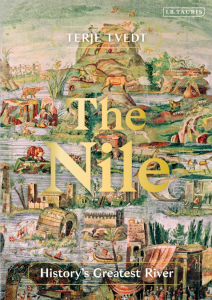The Nile: History’s Greatest River
Reviewed by Sudhirendar Sharma, independent scholar
The secrets of the great Nile River can be uncovered, by slowly uncovering the river’s heartbeat and following it upstream. The Nile emerges as a wellspring of knowledge, the history of human evolution, and development in the region through its flowing waters.
The Nile: History’s Greatest River, by Terje Tvedt, I.B Tauris, 2021, 400pp.
History written on water
If one doesn’t understand the past, misinterpretation of the present is inevitable. Apt in the context of river Nile that courses 6,800 kilometers across 11 countries, historical knowledge becomes critical to make sense of the hydropolitical transformation the region is currently going through. From Herodotus to Flaubert and from Alexander to Napoleon, the waterscape that cuts across the sprawling desert under a cloudless sky and a scorching sun, was as much an inexplicable wonder as an ideal subject of divine kindness. However, it was only during the nineteenth century that the Nile’s geography was systematically mapped.
Having established himself as an acknowledged water historian, Terje Tvedt has condensed 7,000 years of history as one of the greatest rivers in an immensely readable volume that is insightful, engaging and reflective. The Nile can be considered as a historical travelog that begins in Egypt, at the mouth of the great river, and moves upstream along its banks tracing the source of its twin streams – the Blue Nile from the Ethiopian highlands, and the While Nile from Lake Victoria – before the two merge at Al-Mogran in the Sudanese capital Khartoum. The author illustrates that it is only ‘by following the river up from place to place, as slowly and systematically as the river’s own heartbeat, that its secrets can be uncovered, and its role and significance for society’s development can be understood’. The Nile emerges as a wellspring of knowledge, the history of human evolution, and development in the region through its flowing waters.
Written in a nonfiction story telling style, the narrative has been built on the characters and events in history – from Caesar to Cleopatra, to Churchill and Mussolini, and to Abiy Ahmed and Donald Trump – who sought the control and use of the Nile. In the course of its checkered history, the river has remained a perpetual object of political intrigues and power struggles. The colonial march of subjugation of the natives upstream of the river contributed to shifting the goalpost of contention along the river – from the Aswan Dam in Egypt, to the Renaissance Dam in Ethiopia. Over the years, each country sharing the river course has sought to emulate Egypt’s model of development at an ecological cost to its free-flowing waters. Will the river be allowed to ‘live’ remains a compelling question that only emerging geopolitics will foretell.
The Nile qualifies as a fascinating read. It is a travelog enriched with ancient and colonial history that has transformed the region in which most governments in the river basin have drawn plans to control, tame and harness the river. One wonders if the finite natural resource can satisfy everybody’s needs at the same time? Tvedt, a professor of geography at the University of Bergen, is an unrivaled communicator who has kept the interests of a wider readership in mind, while unfolding the biography of a river which is a lifeline for over half a billion people. Without getting hold of the history of the region, understanding its present predicaments may remain evasive/difficult to find.
The contribution of the Nile to the origin and growth of civilization is unparalleled, it nourished the earliest humans who wandered from Africa and populated the earth. No one would disagree that the river has played a crucial role in the histories of the countries through which it flows, even if its importance is somewhat exaggerated in determining the political outcomes. Presenting a multidimensional and pluralistic perspective on the historical water course, Tvedt wonders if piquing the interests of member countries will cause hydrological anarchy, or whether the impending threats will propel the governments to collaborate (for Nile hydro solidarity).
The Nile is an ambitious undertaking, vast in scope and expanse. It is a highly recommended workbook for all those who are interested in how rivers shape history, politics and culture.

